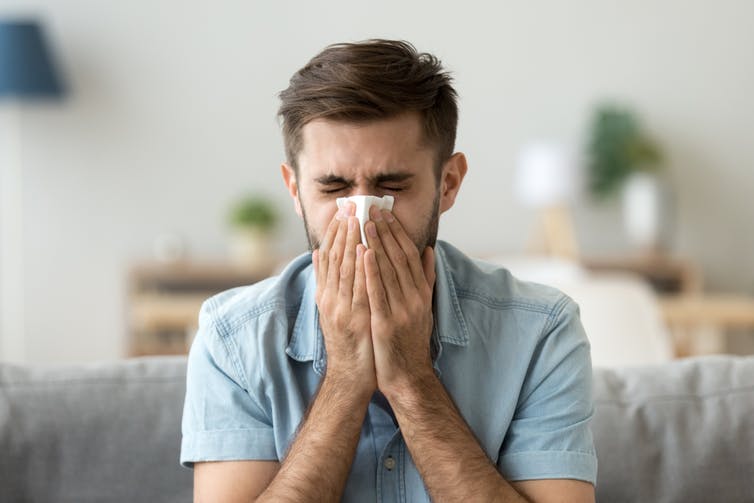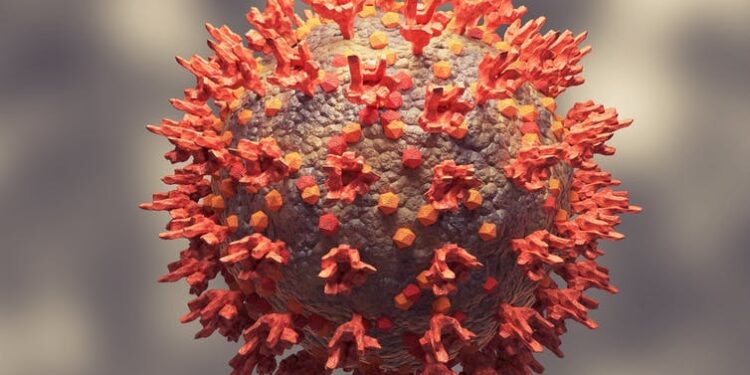The rise of the omicron variant has caused havoc around the world, just as the emergence of the delta and alpha variants did before. A pattern has emerged, with the world scrambling to respond to a new form of the coronavirus every six or so months. How can we reduce the risk of new variants appearing again and again?
Firstly, let’s consider how they emerge. A virus reproduces by making copies of itself. Every time it replicates, there’s a tiny chance that an error occurs in the copying of the virus’s genetic sequence.
This causes a mutation to the new copy of the virus, which has three possible outcomes: the mutation may do nothing, it may weaken the virus, or it may fortuitously give the virus some kind of survival advantage. A rare mutation that better enables survival will over time become more common, as copies of the virus with that mutation will end up being copied more.
Because there’s a risk of the virus mutating every time it reproduces, the more the virus replicates, the greater the risk of new variants appearing. And because the virus reproduces inside us when we’re infected, this means the more COVID cases there are in the population, the greater the risk of producing new variants.
Countering the virus are COVID vaccines. Their most critical goal has been to reduce severe disease and death, and it’s been well proven that they’ve done this. Hundreds of thousands of lives have been saved.
It’s also commonly said that increasing global COVID vaccine coverage will lower the risk of new variants emerging by limiting viral replication. However, this is a bit less straightforward to judge.
Table of Contents
Breakthrough infections
An effective vaccine should also reduce the chance of a vaccinated person catching and spreading the virus. Unfortunately, it’s clear that COVID vaccines cannot produce immunity that completely blocks infection and transmission.
That said, the vaccines did appear to reduce the risk of transmitting earlier variants of the coronavirus – such as the original and alpha variants – both by lowering the risk of a vaccinated person catching the virus as well as their capability of passing it on if infected. (Note that some of this research is still in preprint, meaning it’s awaiting review by other scientists.) This would have helped to lower rates of viral replication and the risk of mutations appearing.

Adao/Shutterstock
However, the newer variants – delta and omicron – fare better in the face of vaccines, increasing the risk of the virus spreading to the vaccinated and so maintaining the risk of mutation. Delta was more effective at infecting vaccinated people than earlier forms of the virus, and omicron is even more effective.
And analysis of UK data from last year shows that peak viral loads – that is, the amount of virus inside someone at the high point of their infection – in vaccinated and unvaccinated people with COVID has become quite similar since the emergence of delta. This suggests vaccinated COVID patients may be just as likely to spread the virus as unvaccinated people.
But these measurements are complex
However, there are few reasons why this isn’t necessarily the case. A key thing to consider is the timing of viral load measurement. Viral load is usually only measured at a single point in time in most people – often shortly after symptoms appear, when the infection is in full swing. But if the virus is cleared much more quickly in vaccinated people, this would be missed by most reports. The window of time when a vaccinated person is infectious – and the amount of viral replication going on in their body – could be much lower than anticipated.
Another reason why viral replication may apparently be similar in both vaccinated and unvaccinated people is the way that peak viral load is typically measured. It’s most often determined by quantitative PCR (qPCR), which measures how many copies of the virus’s genetic material are present, not the number of actual infectious viral particles.

fizkes/Shutterstock
Whether there are infectious copies of the virus in someone can only be accurately assessed by extracting the virus, adding it to cells in a lab and seeing if more viral particles are created. Studies have shown that detecting the virus’s genetic material doesn’t always mean infectious virus is present.
Indeed, a recent Swiss preprint suggests that measuring viral load by qPCR at a single time point doesn’t tell the whole story. This study measured the amount of virus in samples from 384 infected people for five consecutive days after their symptoms started.
Results showed people had comparable levels of the virus’s genetic material in their system on each day of testing, regardless of vaccination status. However, if virus infectivity was measured using replication in cells, viral load was much lower in vaccinated people overall and fell faster over the five days.
Vaccines still make a difference
Ultimately, even if viral load is comparable between vaccinated and unvaccinated people, the most important factor is the overall number of people infected. How many vaccinated people have breakthrough infections compared to infections in the unvaccinated?
A UK study closely followed households where a single delta positive case occurred, monitoring to see whether other members of the household were subsequently infected. Whereas 38% unvaccinated contacts subsequently caught the virus, only 25% of vaccinated contacts did.
Clearly vaccination is not perfect at stopping transmission, but critically, less viral replication was occurring in vaccinated people as a whole group. Emerging evidence from Denmark, still in preprint, suggests that the same may also be true with omicron.
Despite the virus now appearing to evade vaccines more than it used to, ongoing commitment to global COVID vaccination is definitely still key. The number of times the virus gets to replicate overall will be reduced by a tiny fraction for every single person that is vaccinated, and this has to be our best option for managing the threat of future variants.
![]()
Sarah L Caddy does not work for, consult, own shares in or receive funding from any company or organization that would benefit from this article, and has disclosed no relevant affiliations beyond their academic appointment.






























